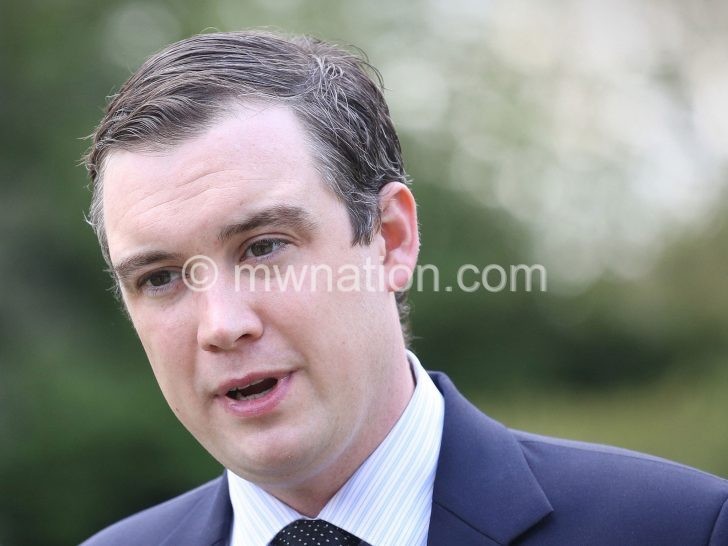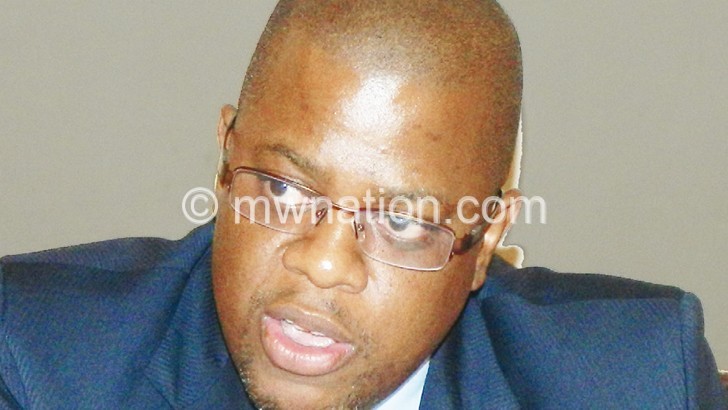Hands off ACB, police–UK
- Improve law enforcement
- Fight corruption
Battle against corruption requires that law enforcement agencies such as the Anti-Corruption Bureau (ACB) and Auditor General (AG) be adequately funded and “insulated from political intereferance”, a British government official has said.

Parliamentary Undersecretary of State at the Department for International Development (DfID) James Wharton, in an exclusive interview from London after visiting Malawi last week, also hinted that future large-scale humanitarian aid from Britain may be pegged to greater transparency and accountability in the manner government manages agricultural institutions such as Admarc and programmes such as Farm Input Subsidy Programme (Fisp).
Said Wharton: “I am deeply concerned about the extent of corruption in Malawi, which is damaging the country’s prospects for sustained economic growth and hitting the poorest hardest. It is a concern I know other donors in Malawi share.
“The UK has a zero-tolerance approach to fraud and corruption and is providing support to the Malawian law enforcement agencies to help them investigate and bring to justice those guilty of defrauding the Malawian people.
“We are pleased to see that our support has helped jail those responsible for Cashgate to a total of 125 years. But there is much more that the government needs to do, starting with ensuring the law enforcement agencies are properly funded and insulated from political interference.”
Wharton described government pledges to table Political Parties Bill, Public Audit Bill, and Financial Crimes Bill in the current session of Parliament as exciting, but said more needs to be done.
UK’s call for the passing of bills to help bring greater transparency in government and those that will support effectiveness of the law enforcement organs comes amid growing concerns from the opposition and civil society about the inertia in law enforcement agencies to crack the whip on the corrupt in senior positions in government.
Last week, the new German Ambassador voiced concern about the rising cases of corruption in the country and pledged support to expose and punish the perpetrators.
“Germany stands ready to support the Malawian authorities to expose, punish and drive out corruption wherever it occurs,” Jurgen Borsch said.
Analysts argue that the independence of law enforcement agencies is compromised by the too much powers vested in the President which include appointing and firing the top brass in ACB and the AG.

In the run-up to the May 20 2014 Tripartite Elections, President Peter Mutharika promised that the appointment and removal of heads of accountability institutions such as ACB, Reserve Bank of Malawi (RBM) and parastatals would be “on merit through a special public appointments committee”.
But when the opposition tabled a Private Members Bill in March this year, seeking to trim presidential powers in the appointment of ACB directors, the government side opposed the motion preceding the Bill, arguing that the powers of the President to appoint were entrenched in the Constitution.
Minister of Justice and Constitutional Affairs Samuel Tembenu led its opposition, arguing that ACB belongs to the Executive arm of government and removing the President’s powers to appoint a director would be a “travesty of the doctrine of separation of power”.
The Bill, appearing as Corrupt Practices (Amendment) Act, 2016 and seeks to amend sections 5 and 7 of the Corrupt Practices Act (CPA) to enhance the independence of the operations of the ACB.
The Bill proposes that Section 5 (1) of the CPA which reads that “the President shall, on such terms and conditions as he thinks fit, appoint the director” should be deleted and be replaced with “the director shall be appointed by the Public Appointments Committee on such conditions as the committee shall think fit”.
In an interview, government spokesperson and Minister of Information, Malison Ndau, while welcoming Wharton’s calls for more action to fight corruption and improving effectiveness of law enforcement agencies, said government is already working on ensuring that relevant laws are passed in Parliament.

Over the past three years, Cashgate in which government lost about K24 billion, according to UK audit firm, Baker Tilly, become the main reference point for corruption in Malawi, but the problem of graft goes much wider and deeper.
For instance, former president Bakili Muluzi has been in and out of court over the last decade answering charges of diverting K1.7 billion of public funds into his personal account while in power.
The late Bingu wa Mutharika come under strong suspicion when valuers claimed he amassed a colossal K61 billion in personal wealth during his time in office and Joyce Banda has been accused of complicity in Cashgate.
Most recently, fraud has been uncovered in embassies, and other government departments and agencies. It is estimated that the country loses 30 percent of its public resources each year to corruption.
After Cashgate emerged, for example, international donors—from whom Malawi used to get around 40 percent of its recurrent budget—suspended their aid over fears it would be misdirected-leading to a budget crisis.
But apart from corruption Wharton said Britain is also concerned about what he described as “unpredictability and lack of transparency” in Admarc, adding that his country would also like to push for continued reforms to Fisp.
He said these issues are crucial for the UK to “justify supporting a large scale humanitarian response in future years.”
But Ndau said the DPP-led government will “very soon” introduce some of the proposed laws which are now at Cabinet level.
“On the question of transparency, for example on Admarc, we would prefer the UK was more specific so that we can tackle those concerns. As government, we know how important transparency is but when someone wants to raise concerns they should be genuine with examples and not just politics,” said Ndau.
The UK is Malawi’s traditional donor, currently it has pumped in £6 million (about K6 billion) to the Health Services Joint Fund which is helping to provide core support to Malawi’s public health system.
A recent report by UK’s The Guardian newspaper suggested that the UK has spent aid money trying to boost its role in Malawi’s oil sector, but Wharton dismissed the claim, saying the support to the oil and gas prospects have been in Malawi’s interests at the request of its government.
He said the aid will support building government’s capacity to effectively regulate and manage oil and gas extraction in the country.
Said Wharton: “Good governance in the extractives sector is critical to maximising the benefits of extraction, preventing corruption, and protecting the environment. As Malawi seeks to develop its oil and gas sector, it is critical that the public sector has the skills to manage it responsibly and transparently for the benefit of all Malawians, and prevent the oil curse that has afflicted so many developing countries.
“By fostering sustainable economic growth in Malawi, including exploring opportunities in oil and gas, we will help eradicate poverty, create jobs, increase revenue and reduce dependency on aid.”
In the wake of a referendum that voted for Britain to leave the European Union, known as Brexit and the subsequent election of Donald Trump as US president, the outside world has been uncertain of how the two developments will affect the world order but Wharton said there was no need for Malawi and Africa in general to fear.
He said Brexit “represents an exciting opportunity for the UK to re-engage wholeheartedly with the rest of the world and deepen its already strong and historic ties with Malawi and other members of the Commonwealth,” adding “leaving the EU will enable Britain to shape its own international trade deals for the benefit of both the UK and its friends and partners.”





